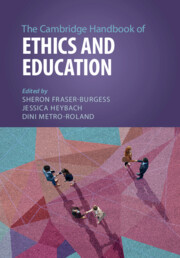Book contents
- The Cambridge Handbook of Ethics and Education
- The Cambridge Handbook of Ethics and Education
- Copyright page
- Epigraph
- Contents
- Figures
- Tables
- Contributors
- Foreword
- Preface
- Acknowledgments
- Part I Traditions in Ethics and Education
- 1 Ancient Chinese Ethics and Education
- 2 Ancient Greek and Roman Ethics and Education
- 3 Ubuntu Ethics and Education in Southern Africa
- 4 Ethical and Environmental Knowledge and Education
- 5 Ethics, Education, and the Inheritance of Abraham
- 6 Prioritizing Outcomes
- 7 Freedom and the Ethics of Educational Authority
- 8 Moral Education in the Virtues
- 9 The Ethics of Bildung and Liberal Education
- 10 American Pragmatism, Democratic Ethics, and Education
- 11 Radical Ethics
- 12 The Ethics of Phenomenology and Hermeneutics in Education
- 13 Feminist Ethics and the Contradictions of Gender
- 14 Postmodern/Poststructuralist Ethics and Education
- Part II Ethics and Education in Practice
- Part III Emerging Ethical Pathways and Frameworks
- Index
- References
3 - Ubuntu Ethics and Education in Southern Africa
from Part I - Traditions in Ethics and Education
Published online by Cambridge University Press: 07 March 2024
- The Cambridge Handbook of Ethics and Education
- The Cambridge Handbook of Ethics and Education
- Copyright page
- Epigraph
- Contents
- Figures
- Tables
- Contributors
- Foreword
- Preface
- Acknowledgments
- Part I Traditions in Ethics and Education
- 1 Ancient Chinese Ethics and Education
- 2 Ancient Greek and Roman Ethics and Education
- 3 Ubuntu Ethics and Education in Southern Africa
- 4 Ethical and Environmental Knowledge and Education
- 5 Ethics, Education, and the Inheritance of Abraham
- 6 Prioritizing Outcomes
- 7 Freedom and the Ethics of Educational Authority
- 8 Moral Education in the Virtues
- 9 The Ethics of Bildung and Liberal Education
- 10 American Pragmatism, Democratic Ethics, and Education
- 11 Radical Ethics
- 12 The Ethics of Phenomenology and Hermeneutics in Education
- 13 Feminist Ethics and the Contradictions of Gender
- 14 Postmodern/Poststructuralist Ethics and Education
- Part II Ethics and Education in Practice
- Part III Emerging Ethical Pathways and Frameworks
- Index
- References
Summary
In our contribution to the debate on African ethics and education, this chapter provides the reader with some insights into the interplay between African ethics and education through the fundamental principles of Ubuntu. Despite some of the criticism raised against Ubuntu as moral philosophy, this chapter shows how the principles of Ubuntu influence character formation in education in Southern Africa. It is through education that morally appropriate behavior is transmitted from one generation to the other. To avoid generalization on a culturally diverse continent like Africa, the chapter makes specific reference to the sub-Saharan countries of Zimbabwe and, to a lesser extent, Botswana and Zambia. The chapter claims that Ubuntu, as a conduit for moral development, has not been given adequate attention in the field of education. Ubuntu is important in creating the kind of citizens Africa needs, individuals who are critical thinkers, whose allegiance is to humanity rather than to personalities and localities. Transmitted through education, Ubuntu helps citizens to embrace democracy and diversity. Ubuntu principles of communalism, justice, love, humility, tolerance, and honesty can be used to address challenges besetting education in Africa and society in general and to promote national and human development.
- Type
- Chapter
- Information
- The Cambridge Handbook of Ethics and Education , pp. 43 - 63Publisher: Cambridge University PressPrint publication year: 2024



